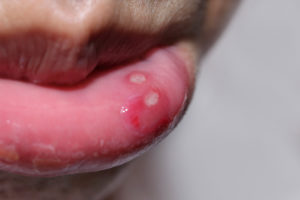
Has this ever happened to you? You’re enjoying a meal and then all of the sudden as you’re chewing you bite down on the inside of your lip or cheek. Within hours, you have a canker sore. Most of the time, this type of mouth sore will heal on its own in a few days. But there are other types that can be persistent. Read on to find out about the different kinds of mouth sores and what can be done to prevent and treat them.
Canker Sores
As I mentioned above, canker sores usually go away on their own. In addition to an injury such as biting your lip, acidic or spicy foods, vitamin deficiencies, fluctuating hormones, stress, or autoimmune disorders can also cause them.
To get rid of a canker sore, keep your mouth clean. Continue to brush and floss, but be careful not to touch the sore with the bristles of your toothbrush. You can also rinse your mouth with a mild saline solution that you can make home. Just mix one teaspoon of salt in a cup of lukewarm water.
Cold Sores
A cold sore is not the same as a canker sore. Most canker sores happen inside the mouth, while a cold sore usually appears on the lips or sometimes around the mouth, under the nose or around the chin. Cold sores are also called fever blisters and are caused by a type of herpes virus. Unfortunately, they are quite contagious. Once a person is infected, the virus stays in the body and can become active under circumstances of stress, illness, sun exposure or allergies.
There are some over-the-counter topical creams that may provide temporary relief from the itch and burn of a cold sore. I can also prescribe an antiviral drug if cold sores are a persistent problem.
Candidiasis
Candidiasis is more commonly known as oral flush. This is a fungal infection that usually causes yellowish or red patches on moist tissue in the mouth. The tissue underneath a patch may be painful, which can make eating difficult. Thrush is usually seen in newborns, people who wear dentures, or in someone fighting disease or whose immune system is compromised. If you’ve just finished taking antibiotics or have a dry mouth, then thrush may also develop.
To get rid of thrush, we have to control the condition that caused the outbreak. For example, denture wearers need to keep their dentures clean and remember to remove and soak them at night. If antibiotics are the cause, then finishing the medication, reducing the dose or changing the treatment can be helpful. In some cases, I may need to prescribe an antifungal medication.
If you have mouth sore that will not go away, then please call my office to schedule an appointment.
Meet the Doctor
Dr. Jennifer Pham is a family and cosmetic dentist in Leesburg, VA. He and his staff provide a range of services to take care of your whole family’s oral health.
